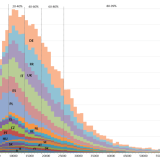
Piețe ale muncii funcționale și favorabile incluziunii
Buna funcționare a piețelor muncii este o condiție prealabilă pentru valorificarea deplină a potențialului de creare de locuri de muncă al economiei, pe măsură ce iese din criza financiară și economică. Criza a avut consecințe foarte diferite asupra piețelor muncii în statele membre ale UE, unele grupuri, cum sunt tinerii și persoanele cu nivel scăzut de studii, fiind afectate deosebit de puternic. Actualele schimbări structurale rapide prezintă, de asemenea, noi provocări legate de posibile deficite de forță de muncă și necorelări ale competențelor în diverse sectoare și regiuni.
Principalul instrument al UE de promovare a ocupării forței de muncă și a incluziunii sociale este Fondul social european, prin care oamenii sunt ajutați să obțină un loc de muncă, persoanele defavorizate sunt integrate în societate și se asigură oportunități de viață mai echitabile pentru toți. Există, de asemenea, o legislație europeană cu arie largă de acțiune, care reglementează drepturile lucrătorilor pe piața de muncă. În plus, în aprilie 2017 Comisia Europeană a lansat pilonul european al drepturilor sociale. Pilonul valorifică și completează politica socială și de ocupare a forței de muncă a UE pentru a orienta politicile dintr-o serie de domenii esențiale pentru piețe de muncă și sisteme de protecție socială funcționale și echitabile.
- Comisia Europeană: Fondul social european
- Comisia Europeană: Pilonul european al drepturilor sociale




























